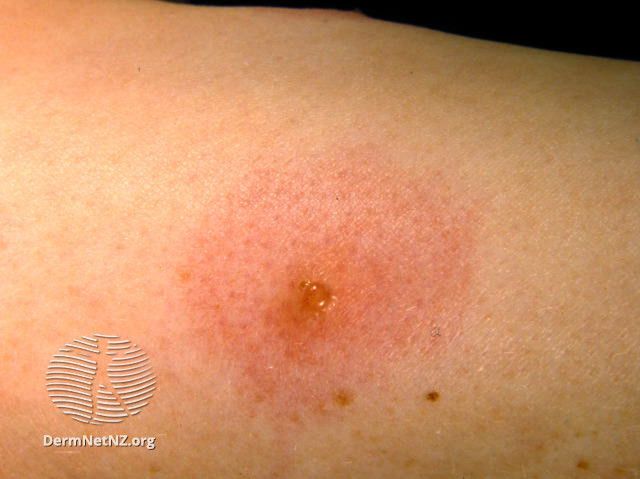
Everything You Need to Know About Wasp Stings, According to Experts
Summer's right around the corner, and you know what that means: picnics, swimming, and encounters with annoying (and sometimes venomous) bugs. And wasp stings are some of the most painful of those run-ins, according to MedlinePlus, a resource of the US National Library of Medicine.
Wasps, like bees and ants, are part of the scientific order Hymenoptera, of which there are 150,000 different species. Both wasps and bees come with a stinger for self defense. That stinger contains venom, which is transmitted when a wasp stings you-that's what can cause the pain you feel, along with a stinger that could get lodged in your skin after a sting.
Wasp stings can either be a painful nuisance or they can trigger a full-blown allergic reaction, depending on the person—so you want to avoid them altogether if you can. Here, experts weigh in on what you need to know about wasp stings, including symptoms, treatment options, and prevention methods.
First: What does a wasp sting look like?

Upon first glance, the local reaction of a wasp sting might not look too different than many other bug bites or stings. They're usually swollen and either pink or red, Michael Cameron, MD, an assistant professor of dermatology at Icahn School of Medicine at Mount Sinai in New York, tells Health.
Additionally, there's typically a red mark that looks like pen prick in the center of the sting, Tania Mucci-Elliott, MD, an infectious disease, allergy, and immunology expert at NYU Langone, tells Health.
What are the symptoms of a wasp stings?
This depends on whether or not the person stung is allergic to wasps. If someone only has a local reaction-the red, swollen patch on the skin that shows up where the sting happened-they may only feel itching or pain at the site, per MedlinePlus. "While the initial symptom at time of sting can be pain, most people complain of itching afterward," Dr. Cameron says. This usually calms down within a few hours of the sting.
In some cases though, wasp venom can cause a severe allergic reaction or anaphylaxis. Signs of a larger reaction can look like any of the following symptoms, according to MedlinePlus:
Swelling in the lips, tongue, mouth, and throat
Rapid heart rate
Collapse (from shock)
Decreased blood pressure
Difficulty breathing
Hives
Diarrhea
Abdominal cramping
Nausea and vomiting
How are wasp stings treated?
As long as the person isn't having a severe allergic reaction wasp stings can be treated at home. "If there are no signs of a systemic allergic reaction, then a doctor would not handle things very differently than what a person can do at home," says Dr. Cameron.
Your first step: remove the stinger (if it happens to get lodged in your skin, which isn't always the case) by carefully scraping a straight-edged object over the top of it (think: a fingernail or credit card). According to Dr. Cameron, you should avoid squeezing the stinger with tweezers so additional venom isn't released.
Once the stinger's gone, wash the site with water and gentle soap, apply a cold compress to keep the swelling down and try an over-the-counter medication like ibuprofen for pain, says Dr. Cameron. Dr Elliott also recommends keeping the area elevated and using an analgesic like Cutter Bite MD Insect Bite Relief stick to help with pain and itching.
While most should be able to treat a wasp sting at home, if you've been stung multiple times, going to your local urgent care clinic or another doctor's office might prove beneficial, as an expert might be able to help you remove multiple stingers from your skin.
When should you seek medical attention for a wasp sting?
While many people will only have a minor local reaction to a wasp sting, the possibility of a serious allergic reaction is possible-especially if someone gets stung by a wasp for the first time.
It's important to keep in mind the signs of a severe allergic reaction (listed above) in this case. "If swelling spreads to areas besides the sting location or if you develop difficulty breathing, nausea, widespread hives, dizziness, you should go to your local emergency department as this would be signs of a systemic allergic reaction," says Dr. Cameron. There, they may treat you with epinephrine, which you can also keep on hand in the form of an EpiPen if you have a history of severe allergic reactions.
Even if you aren't experiencing any of the telltale signs of a severe allergic reaction but still feel like something's off, it can't hurt to check in with your doctor.
How can you prevent future wasp stings?
If you're going to an outdoor picnic, consider bringing covers for any food and drink items you'll have out, so that you can minimize the chance of attracting wasps. If you frequently notice wasps in your backyard-or another area near your home-you should regularly check for wasps' nests in that location, Dr. Cameron says.
Additionally, it's important to simply be mindful of where you're hanging out when you're outside. "Try to avoid areas where there will be wasps, like eaves of houses [and] near trash cans," Dr. Elliott says.











